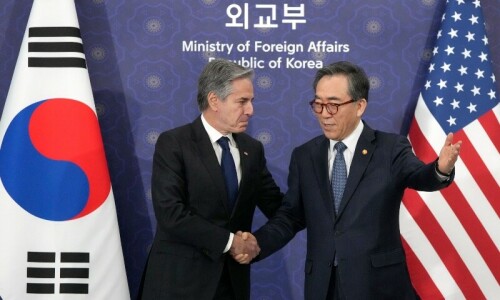KARACHI: As the rupee’s alarming descent against the US dollar continues unabated, experts and stakeholders point fingers at the powerful grip of the grey market and the International Monetary Fund’s (IMF) “significant interference” in the country’s banking and currency sectors.
Some said it was unprecedented that the IMF had allegedly got deeply involved in the country’s financial framework, interacting at granular levels with local exchange companies and banks.
A known currency dealer alleged that this heightened engagement stemmed from the Fund’s mistrust towards the government, leading the lender to directly ascertain dollar rates from the banking and open markets.
“The IMF people interact with the exchange companies and bankers in Pakistan at the lowest level, which was never witnessed before,” a senior banker said.
Bankers, dealers also hold interim set-up, economic uncertainties responsible for vulnerable exchange rate
Challenging conditions set by the IMF against a recently signed $3 billion arrangement, which includes maintaining unrestricted imports and a hands-off approach to the exchange rate, have raised eyebrows.
A high-ranking official of a private bank, who spoke on the condition of anonymity, said the government and State Bank of Pakistan had lost control over the exchange rate. He described the situation as a “double-edged sword”, which he said was detrimental to both the rupee and the broader economy.
Shamshad Akhtar, the interim finance minister, has expressed her willingness to remain within the IMF framework and is reportedly preparing for a crackdown on illegal exchange companies.
Currency dealers said there are at least three types of grey markets — first, individual or firms trading in currency without a licence; two, several exchange firms whose selling price is almost equal to the grey market rate; third, the one operating outside the country.
The overseas operators are the most harmful since the dollars do not come into Pakistan; only local currency is provided to the remitters in Pakistan. It is also the reason for declining remittances. The country lost $500 million in remittances in July as it fell to $2bn compared to $2.5bn in the same month last year. The country lost over $4bn in remittances in the previous fiscal year.
“The government may crack down on illegal operators of currencies and reduce the smuggling [of dollars] to Iran and Afghanistan, but the basic reason for a weakening rupee will keep the exchange rate in trouble,” said Zafar Paracha, general secretary of the Exchange Companies Association of Pakistan, pointing to the short supply and high demand for dollars.
He said currency trading had become one of the most lucrative businesses, and thousands of people were joining it. “It is highly attractive and succeeded in attracting inflows from remittances and export proceeds,” he added.
But beyond the grey market and the IMF, several experts also point to political and economic instability as substantial contributors to a vulnerable exchange rate, particularly since the caretaker set-up took power.
“The word ‘interim’ amplifies the already existing uncertainties. This government would lose more than what we have lost during the previous government,” said Amir Aziz, an exporter of finished textile products.
Tresmark CEO Faisal Mamsa said, “The interim government trying to overstep its perceived capacity, which is sending a conflicting message to markets.”
Published in Dawn, August 27th, 2023











































Dear visitor, the comments section is undergoing an overhaul and will return soon.